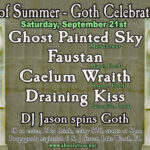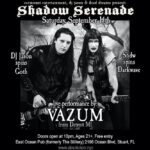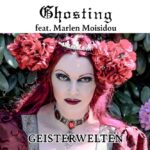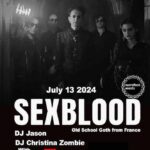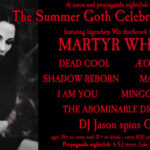DARK SIDE COWBOYS… One of Sweden’s oldest dark /goth bands… Sheriff Nik talks about the early days, rebirth and future of the band and goth culture… by Tzina Dovve…
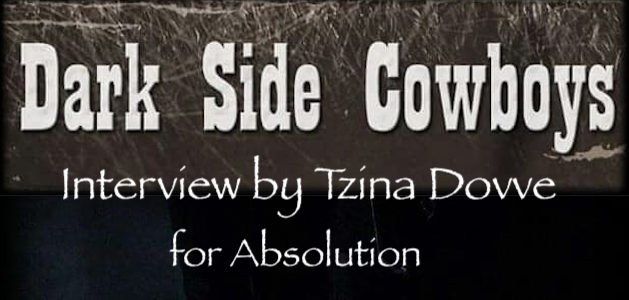
Tzina: As l understand Dark Side Cowboys have been active since 1993. When and where were you formed and who are the current members?
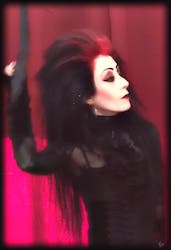
Sheriff Nik: Yes, DSC formed back in 1993 and it all started in a basement in Strömsund, in the county of Jämtland, northern Sweden, where I (current member and founder Nik) met with, now former member, Comacat. We sat down with an old tape recorder, a KORG M1 workstation and one old acoustic guitar. Then things went from there. The cassette tape recording from that session actually still exists and parts of it have also been released on an early demo.
Current members of the band besides me (Nik) are Atreyo, Jonah and VigilAnte. Atreyo, the undertaker, has been around since the early years. He joined the band in 1994, just a few months after it was formed. He left the band in ’96 and returned with full force in 2012. Then, he also brought back, what I would say is the classic bass style of the early DSC sound. The multi-talented VigilAnte first joined the band back in ’97 and stayed for about 6 more years. He was part of the ‘Disclosure’ and ‘Believe’ era and then also left for some years before returning in 2011 to work on what became the ‘Chronicles’ album series and the new ‘Return’ album.
Finally, we have the gunslinger Jonah, who joined the band in 2014 when he found his way to the riders’ nest. He brought his guitar and violin along and even though the world has now gotten a taste of what he brings to the DSC sound, there is much more to come in future releases.
This is the current core of DSC, but like a western style band of riders, we are occasionally joined by others and during the years we have, for example, joined forces with Vagrant Bob, Poker Hart and Scavenger John.
Tzina: What prompted you to form a band and give it the characteristic name of Dark Side Cowboys? Was it a group decision or just something at the spur of the moment? What is the story behind this title?
Sheriff Nik: Well now, there are some versions of this story, but to start with what made us begin our journey, the motivation was clear. There was no one else making the kind of music we imagined so we had to create it. You could say it was a calling of some kind and it has been ongoing ever since.
As for the name, it actually appeared in front of our eyes. We had some other early ideas, but they didn’t feel quite right. One early name was ‘Monochrome’ and that later became a well known Swedish goth club back in the 90’s.
The name Dark Side Cowboys is not just random, it has some depth to it, since it sort of tells you who we are, but it also tells you that we do not go by the typical western ideals, rather something of an inversion of all that and what it represents. We like our art and music to make people think, to feel something and not just give out simple answers.
Most of us are based in the northern parts of Sweden which is also a factor that comes to play. The nature and surroundings here is something you really have to experience and it has had its impact on our music and art. You can probably also tell that we have some sense of humor. Even though we can be quite pretentious at times, one also needs to have some self distance. All this is sort of built in the band name, I believe.
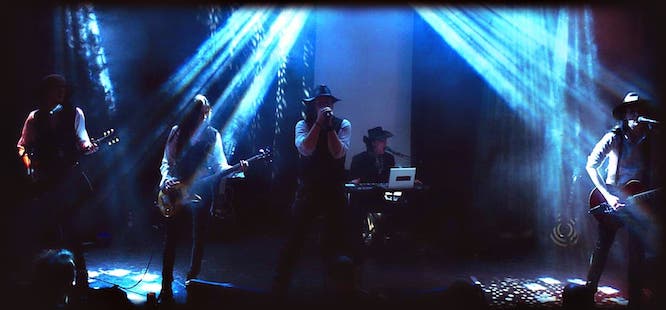
Tzina: Who is the main songwriter in the band? Where does your inspiration to write songs derive from? What are your musical influences?
Sheriff Nik: There is not really a main songwriter, it’s rather a collaborative effort. We try to have a very open mind when it comes to the songwriting process and not to follow a certain pattern all the time. Sometimes, one of us writes a piece that the others then take on, and other times it can be formed in a jam session where something just emerges. Sometimes it starts with just a chord, sometimes with a rhythm, a feeling, a word. I would say I have the role of artistic leader of some kind, but it usually just means that I will choose a path or give a certain direction and we take it from there. Most of the time, I think we are just going down that road by intuition really and we all seem to sort of know how to proceed together.
It is a mindset and when writing music together – if possible – we usually try to be isolated from the world and one ideal place is to stay in a cabin in the woods where we have one of our studios to work in. The process of writing is to channelize thoughts and emotions and trying to express this in our music. As for musical influences there are many talented artists out there and tons of good music to be inspired by. I prefer being inspired rather than influenced I would say.
When it comes to the lyrics I (Nik) tend to do most of the writing though. When it comes to inspiration for songs it can be and it has been so many things, rather than just something in particular to point to. You’d probably have to ask me a bit more of a specific question, if I am to comment on a certain song, text or album or so, and I might be able to explain what that was all about and how it came to be, there and then.
Tzina: After quite a few releases throughout your music career your last cd was released in April 2018 with the title ‘Return’. Is there a symbolic meaning behind this name? What feedback has this album received and what makes it different from the rest of your releases?
Sheriff Nik: It certainly has a lot of meaning behind the name and like many of the titles and lyrics that we have, it can be interpreted in different ways, and that is something we like. ‘Return’ could be a reference to the fact that it is the first full DSC-album with new material for over a decade. It could also refer to that we have returned to the place it all started or that the riders have returned to form a new band. It could refer to some of the lyrics or the title song itself where ‘Return’ refers to a personal journey or it could simply say ‘Return’ and the listener can choose.
The album has received a lot of good feedback and praise from many old fans, but as most things in the subculture scene and in the music scene in general, especially these days, it is very hard to reach a wider audience. So, even though it has been well received, it has not yet been a huge success so to say. Working as an independent artist, one has to devote a lot of time and resources to marketing and that does not leave a lot of room for creativity and actual music making, so it is a delicate balance to make room for both.
As for what makes ‘Return’ different, well, every release we have made is different to the others in some way, usually very different – and that is sort of our philosophy. “Why create something that has already been done?” is a question I believe every artist should ask themselves. Sometimes, of course, the theme of repetition or referencing to the past is, of course, the goal, but for each release we try to aim for something that we haven’t done before, exploring new territory. We usually work with conceptual albums, overall themes or try to focus on something that we wish to explore. Therefore we seldom tend to have several releases in a row that sound similar.
Well, even for our ‘best of’ series we chose not to simply re-release old songs, rather we re-recorded them and arranged them to become almost new albums, hence the ‘Chronicles’ series that we released for our 20-year anniversary.
As for ‘Return’ it is a pretty straight forward album with songs that present a new DSC-sound, a sound that also sort of takes us back to where we started. That part comes very natural, having Atreyo back in the band, but the sound also brings forth the dynamics of the new line up and what happens with the soundscape as we come together. ‘Return’ also has an overall story to tell as well as each song has a story of its own.
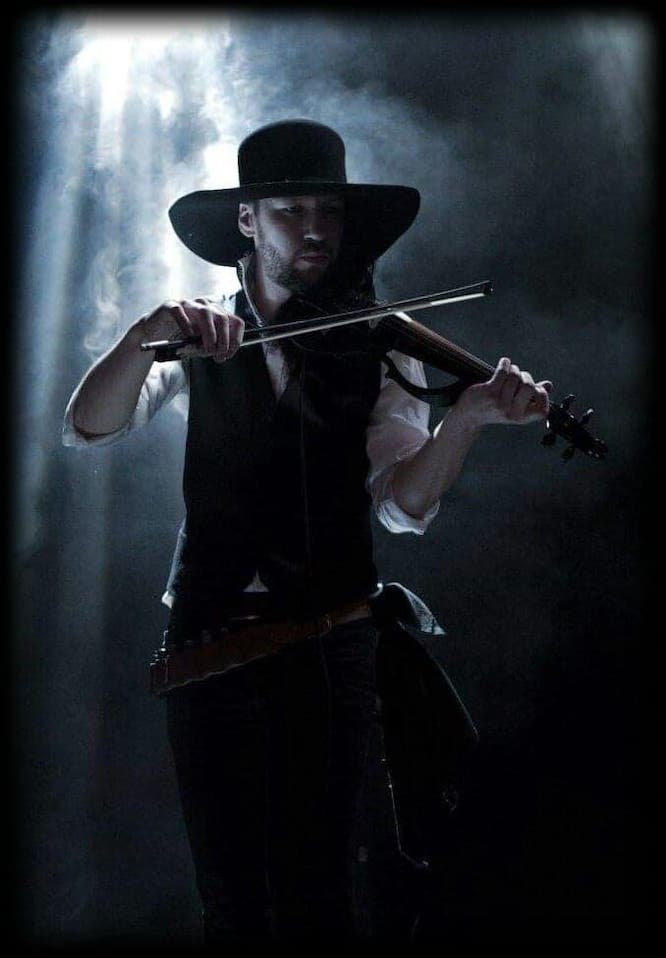
Tzina: As l understand, Dark Side Cowboys participated on the western theme compilation ‘A Gothic Western ‘ which has just been released this month during lockdown. How did this come about? Can you elaborate on this participation?
Sheriff Nik: Well, I believe we were asked to join since we were kind of an obvious choice to the artistic leaders of Venus Aeon, who compiled it. We actually wrote this song during lockdown and it has been produced in 4 different studios across Sweden and also Finland. It is one of the first songs and productions that we have done from scratch without actually meeting with each other sometime during the process. We wrote the song to go with the theme of the album, but the song is also part of a series of songs that we are currently in production recording, so even though it is a stand alone piece it also fits a bigger picture soundwise for DSC. To top it off, we also asked Kari Berg, aka Poker Hart to do some additional vocals and then we sent a message to our fellow riders in the east, to Marko of Two Witches and Chaos Research in Finland, who joined the song with cello and bass jaw harp!
Tzina: Are you currently working on any other new material? Are there any plans for an upcoming album in the near future?
Sheriff Nik: As a matter of fact, we are and you are the first to know. We are currently working on new material and we aim to present further details on it when it is to be released to the world in the near future. I’d be happy to return to talk more about that in the future.
Tzina: Dark Side Cowboys are an active live band. Do you have any plans for upcoming shows when the world finally re-opens ?
Sheriff Nik: We do play live, yes, although very selectively these days. We try to make the live performances count. At the moment, there are no plans for future gigs. I guess we will just have to wait and see how long the current plague lasts and when it is safe to go on the road again.
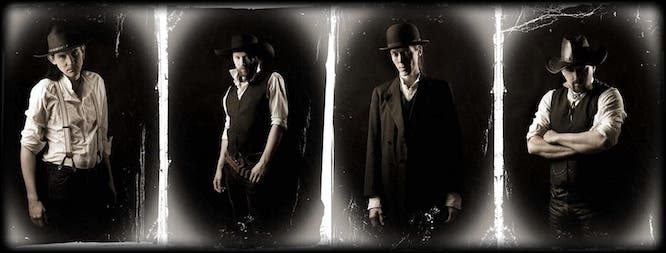
Tzina: Do you view the Dark Side Cowboys more of a live band or studio band? What do you enjoy more as musicians? Do you enjoy doing covers?
Sheriff Nik: As for being a live or a studio band, we are neither or both, I would say. This might also sound a bit pretentious but, to perform for a live audience is to choose one way, one format, to present our art. To record things and release them is another. To make a music video adds yet another dimension and so on. Dark Side Cowboys is all about trying to create something that we like, the way we want it to be. Then the challenge is to bring this to an audience, trying to give the listener this experience but the good thing is that in the interaction with the audience the outcome is never predictable. Each and everyone will have their own experience and that is the beauty of it.
As for covers, it can be fun at times, and we have done a few over the years, but we are not into covers, in general, no. We prefer creating our own music as a band and that can be a never ending process in itself and most of the time one cannot make a cover that is better than the original version, so it ends up being more of a tribute, which can all be fun, but it is something totally different compared to creating and performing music of your own.
Tzina: What is your opinion on today’s dark/goth /alternative scene? How much do you believe it has changed over the years? Do you believe there is some sort of goth revival at the moment?
Sheriff Nik: This will be more of a personal answer from me, rather than the opinion of the band. It would take a book to cover my thoughts on the subculture scene and the development over the years and that is something I usually talk a lot about in my other work as well.
The goth scene seems to be always changing and that is of course a good thing, since the opposite would mean it has stagnated. But what is progress in itself and what is a reaction to the world around us is not easy to define. There are changes within the scene, but many of these changes have also a lot to do with how the world changes, in general, and how that in turn affects the scene. That goes for everything, from socio-cultural aspects, like how and where people meet, how the club culture has changed to how people interact and communicate before and after the internet became available to everyone and, of course, all this will also somehow affect the subculture scene and vice versa. Even though many artists go their own way and come up with truly original ideas, there is always also some context to how this actually came to be, when, where and why.
Again, then for the so called goth scene, what started decades ago as an underground movement has now evolved, been reinvented and keeps growing. There are huge differences between now and say 20 years ago. Kids growing up face a totally different world and we have to, for example, live with the fact that what was the goth scene in the 80’s and 90’s is something that has now become music and culture history (even though that history has not been recognized and accepted by the high arts councils as of yet). The hegemony, the mainstream culture and the subculture has always been dependent on each other, whether we all like it or not.
Those who were part of the scene and still are, of course, bringing tradition and history along, and those who live to tell, can talk of the old days, but there is a totally different world out there now. What stands out to me is that young people still tend to fit right in, as if they were actually there back in the days. That to me is a clear sign that we are not talking about a fashion trend, a music one hit wonder, but of a culture movement, a way of thinking of just a way of life.
But, of course, as any other culture the goth scene is also changing with time. Another aspect that we could look at is recording and distribution technology. What used to cost hundreds of thousands and where you needed a huge vehicle just to transport stuff to a gig or when you needed a huge studio room to just fit everything and connect everything, now all fits in the palm of your hand. Today you can have a decent studio environment at home and the quality can be high end. All this also affects the subculture scene and I believe it has had tremendous effects over the years, effects that we will only be able to see in retrospect in the future.
If there is a goth revival, I can’t really say. Has it ever been gone? I can say that, of course, we see how mainstream culture tends to find, for example, the goth style fashionable as a trend and it seems to come back some every 5-10 years. That is not a development of the scene in itself, but it could result in some kind of closure I believe. Whenever we see a new alternative artist break through and become well-known, those genres also tend to become less underground. Take, for example, punk rock. There we have a natural anti-movement or reaction to it that tends to give birth to new styles, new ideas and usually either be inspired by or totally reject what came before. This is a natural cycle in culture and art, how humans tend to evolve.
We have also seen a global decline in the subculture scene from what it used to be, since the gentrification process of modern cities has had an effect on a lot of areas that used to be full of interesting subculture movements. Also, the behavioral patterns for how people attend clubs, festivals and events has changed. Again we have the constant process of what is hegemony and what is subculture and how those two tend to depend on each other and no I am not going down the R. Florida path here, although it may seem so when talking about what they call the creative class. Art is not something one can grow on demand but you can support the growth, but that is something totally different.
Still, we have a very different world today than just 10 years ago and most definitely if we look back some 20 or 30 years. On one other hand, the world is a lot smaller since many now can connect through the internet and technology advancements have made it possible to create and distribute art in new ways. On the other hand, it has also resulted in that there are so many alternatives out there that it is a big challenge to reach that wide audience that is actually available. Unfortunately the ones who can have such a wide reach are usually huge corporations and a lot of the music industry is designed to enhance that, to optimize the profits, ‘cause why wouldn’t it be? Well, on another perspective, that is certainly nothing new either, since that is the way it has always been, but the scale is different though I would say.
I know that some cultural phenomena tend to come back in waves and well, given the current state of the world I would not be too surprised if there will be a backlash to the current mindset and room for thought and reflection. To me, that is when the goth scene actually makes a lot of sense to re-appear. The goth movement on one hand used to, in many ways, be quite an intellectual response to the 80’s general mindset and way of living. Maybe that has some relevance now when we face the situation we’re all in. As always art tends to reflect the spirit of the time. This may well lead to a revival or rebirth or perhaps something totally different.
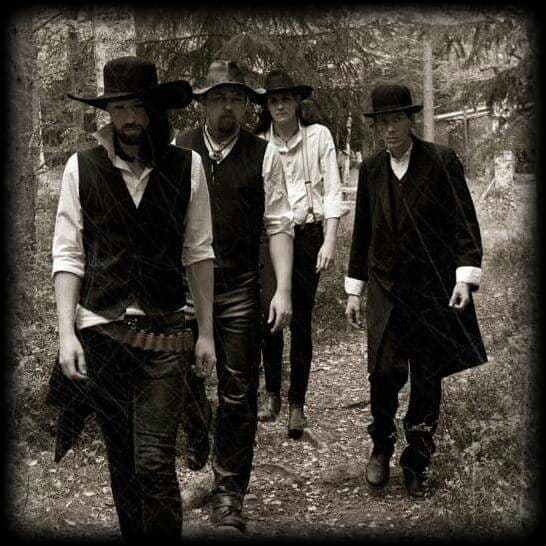
Tzina: What is your most memorable experience with the band throughout your music career?
Sheriff Nik: There are so many memorable moments, so it is hard to pick just one. I could probably go on for hours talking about old memories, tour stories and stuff.. so well, I will try to pick a couple of highlights rather than just one, let’s see…
The moment when you actually have recorded your first songs and release them, is of course a once in a lifetime thing. I can still recall exactly how the recording process went down back in 1993, how we managed to somehow rebuild and reconnect an old Fostex M80 (as in the old analogue 8 track tape machine recorder) to a small analogue mixing console along with some rack mounted effects and somehow we made all of that work!
Back then I had never done anything like that before and I had no education whatsoever in the field, it was just a feeling that this is what I had to do so I went with it. And I guess you could say we taught ourselves to become studio engineers back then so somehow we managed to record a full length MC demo of about 45 min. All this happened just in a couple of months after we had formed the band. If we look at all of this now it is sort of like baby pictures from ancient times, but they are fond memories. There were so many opportunities that followed as we learned how to master the soundscapes.
Another really impactful moment that comes to mind is when we played at Arvikafestivalen back in ’98. Having previously done some tours during the years, mostly at obscure clubs and smaller venues, all of a sudden we were standing there, in front of a huge crowd, on the second biggest stage in what was considered THE subcultural festival in Sweden back then. That was probably one of the most surreal experiences I’ve ever had. It took some time for it to sink in. I would have laughed at the situation as an impossible scenario some 5 years earlier, but suddenly came to be reality. It was quite a humbling experience and something I also consider myself fortunate to have been part of.
Well, as I said, there are so many stories I could tell but I’ll stay there for now.
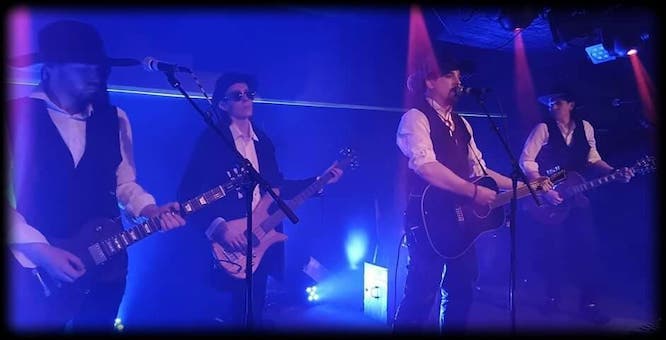
Tzina: What does goth mean to you personally?
Sheriff Nik: That is a very, very difficult question. There are so many different things people think of when you say that word. To me, personally, I think goth is first and foremost a lifestyle, the name of a cultural movement that is pan-national. To me it is not something that is easily defined. It is something you cannot simply choose to be, but something you are and it is of course also something you can become.
I believe in general the goth community is very friendly and inclusive, but like any subcultural movement, I guess it can also probably appear to be scary for those who have no experience of or knowledge about it. That is the short answer, but well, if I am to elaborate… Being goth, or whatever you would call it, has in my opinion very little to do with looks, style or even taste in music. It is not that simple. For too many people, in general though, goth is probably the name of a musical genre, which is just one part of what I would refer to when talking about the goth subculture.
Even though many argue that the goth movement simply came out of the post punk movement back in the late 70’s and then evolved, there is also a wider perspective to take in consideration here if we look at what makes it a subculture in general and what actually defines it.
To me there is much more to goth music than just a simple label that explains it all. The goth scene in music is of course on one hand defined by the goth fans themselves, but I would argue that the definition is also highly depending on the mainstream perspective and the way we look at subcultures in society in general. That is something that we have to take into consideration when talking about the scene, to try to see what is beyond the surface and the superficial traits. If you look beyond that you’ll find that it is very hard to actually define a subcutural movement, beyond a musical genre and it’s supposed followers.
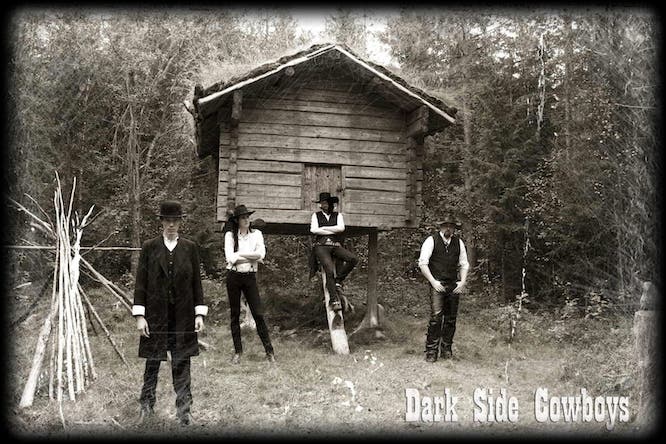
Tzina: Anything else you would like to share with your fans? What can they expect from Dark Side Cowboys in the near future?
Sheriff Nik: Well, we are making plans for the future while in lockdown, and we bide our time waiting to be able to once again hit the road in the future. There will be new material to be released, hopefully in the near future, so stay tuned.

